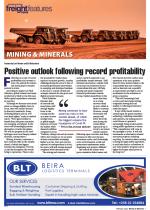Eskom’s proposed 20.5% tariff hike for 2022/23 does not bode well for the mining sector.According to the Minerals Council, the tariff proposal currently under evaluation by the National Energy Regulator of South Africa (Nersa) is simply not sustainable for the mining sector.“In fact, it is not just for the mining sector that this requested tariff increase is unsustainable, but for the entire country, where four out of ten adults are unemployed and economic growth has stalled. The increases being requested by Eskom for the financial periods 2022 through to 2024/25 represent R279 billion, R335 billion and R365 billion per year in the three-year period.”The Minerals Council, which has actively participated in Nersa’s public hearings into Eskom’s tariff hike request, has gone on record to say that these increases, if allowed, would be catastrophic for the mining sector – and the economy in general.The mining industry adds 8.4% or R500 billion to GDP. Total mineral sales amount to R826 billion. Mining, processing, smelting and refining of minerals consumes about a third of Eskom’s electricity. The industry employs more than 450 000 people, which is 4.7% of non-agricultural employment.According to Minerals Council chief economist Henk Langenhoven, Eskom’s tariff proposal, if accepted and implemented, will fundamentally restructure input costs for the mining industry, increasing them from 11% to 16% on average for intermediate inputs.“A stable, affordable and predictable price path of electricity is important for the viability and growth of the mining sector,” he said.Furthermore, said Langenhoven, it was critical to note that the mining sector was a price taker and could not inf luence selling prices. “Therefore, cost increases erode profit margins and thus sustainability of the sector.”He said the 20.5% tariff application by Eskom could not be considered in the absence of other amounts pending to Eskom. He warned that the tariff increase could, in fact, be as high as 54%, depending on the phasing of the court judgement instructing Nersa to liquidate outstanding regulatory clearing accounts and disallow fiscal augmentation from the government, Eskom’s sole shareholder.“At present, electricity contributes 11.15% to intermediate input costs in the mining sector. Factoring in a 54% or 55% adjustment to electricity tariffs will result in electricity’s share of intermediate input costs increasing to 15.91%. It would also result in the mining sector paying R15.3 billion more towards electricity.”Langenhoven said as the share of electricity to input costs increased, any further increase in electricity tariffs would have a compounding effect and a much greater adverse impact on the overall inf lation trajectory of the mining sector. "A stable, affordable and predictable price path of electricity is important for the viability and growth of the mining sector.– Henk Langenhoven
‘Eskom’s proposed hike will cripple industry – and country’
24 Feb 2022 - by -
0 Comments
Mining & Minerals Feature February 2022

24 Feb 2022
24 Feb 2022
24 Feb 2022
24 Feb 2022
24 Feb 2022
24 Feb 2022
24 Feb 2022
24 Feb 2022
24 Feb 2022
24 Feb 2022
24 Feb 2022
Border Beat
Today 11:30
11 Feb 2025
Featured Jobs
New
New
New
